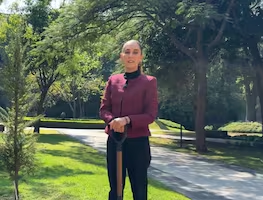Más Información

Sheinbaum cierra el 2024 con mensaje de Año Nuevo; recuerda legado de AMLO y reafirma continuidad de la 4T

Científicos de la UNAM desarrollan lombricompostaje; una alternativa eficiente para el manejo de heces caninas
The Obama administration will soon expand efforts to help Central American families and children legally immigrate to the United States amid another surge of migrants caught crossing the border illegally.
White House Deputy Homeland Security Adviser Amy Pope said Tuesday that the administration will expand in-country refugee processing for families coming from Honduras, El Salvador and Guatemala and launch an effort to temporarily relocate some families facing the greatest threats to Costa Rica.
The government is also broadening a nearly two-year-old program to allow some Central American children to reunite with parents already legally living in the United States.
Deputy Homeland Security Secretary Alejandro Mayorkas said that program will now allow some unmarried siblings, in-country parents and other caregivers to move to the U.S. with a child approved for the program.
The efforts are designed in part to combat the crush of tens of thousands of families and unaccompanied children caught crossing the border illegally this year. But it is unclear how quickly the expanded efforts may impact the flow of immigrants trying to make their way to the United States illegally.
Since the start of the budget year in October, more than 51,100 people traveling as families and more than 43,000 unaccompanied children have been caught illegally crossing the Mexican border. The number of such immigrants has been steadily rising this year after significant decreases between the 2014 and 2015 budget years.
The Obama administration first launched the effort to allow child immigrants to legally come to the U.S. in December 2014. More than 600 have moved to the United States since then. Mayorkas said 2,884 kids have been approved for the program and more than 9,500 applications are pending.
In January, the administration first announced that the United Nations High Commissioner for Refugees would pre-screen would-be refugee families. U.S. officials will now handle more in-country processing for those families.
Pope said refugee programs in Central America are being expanded because "current efforts to date haven't been sufficient." The new programs, she said, are designed to help "promote safe and orderly immigration and border security."
Pope said it is unclear how many families and children may benefit from the enhanced programs but officials expect requests for help to steadily increase as the programs get underway in the coming months.
In the meantime, Costa Rica will also soon start accepting up to 200 people in immediate need of refuge at a time for up to six months.








